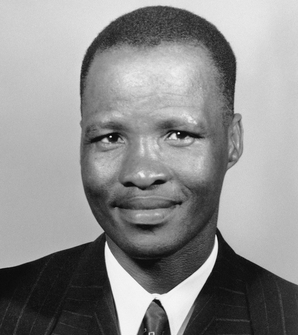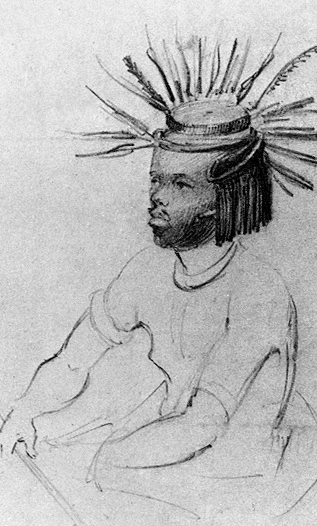
Transkei, officially the Republic of Transkei, was an unrecognised state in the southeastern region of South Africa from 1976 to 1994. It was, along with Ciskei, a Bantustan for the Xhosa people—and operated as a nominally independent parliamentary democracy. Its capital was Umtata.

The United Democratic Movement (UDM) is a centre-left, social-democratic, South African political party, formed by a prominent former National Party leader, Roelf Meyer, a former African National Congress and Transkei homeland leader, General Bantu Holomisa, and a former ANC Executive Committee member, John Taylor. It has an anti-separatist, pro-diversity platform; and supports an individualist South Africa with a strong moral sense, in both social and economic senses.

King Kaiser Daliwonga Mathanzima, misspelled Matanzima, was the long-term leader of Transkei. In 1950, when South Africa was offered to establish the Bantu Authorities Act, Matanzima convinced the Bunga to accept the Act. The Bunga were the council of Transkei chiefs, who at first rejected the Act until 1955 when Matanzima persuaded them.
Botha is a common Afrikaans surname, derived from the Friso-Saxon Both. It was brought to South Africa in 1678 by Frederich Botha.

Bantubonke Harrington Holomisa is a South African Member of Parliament and President of the United Democratic Movement.

The Mpondo People or simply AmaMpondo, is one of the kingdoms in what is now the Eastern Cape. Having been established way back in the year 1228. The AmaMpondo Nation were first ruled by its founder who was King Mpondo kaNjanya who lived around (1205-1280) and later the 'AmaNyawuza'clan, by nationality referred to themselves as 'AmaMpondo'. They are related to other AbaMbo kingdoms and chiefdoms in South Africa.
The following lists events that happened during 2006 in South Africa.
Princess Stella Sigcau was a Minister in the South African Government. Sigcau was also the first female Prime Minister of the bantustan of Transkei before being deposed in a military coup in 1987.

The Military Rule Medal was instituted by the State President of the Republic of Transkei to commemorate the bloodless 1987 military coup d'état which overthrew the Transkei government on 30 November 1987.

Zhong is pinyin transliteration of several Chinese surnames, including Zhōng (鍾/钟), Zhòng (种),mistakenly for Chóng, cf. zh:种姓 and Zhòng (仲). These are also transliterated as Chung, Cheong or Choong, Tjung or Tjoeng, and Chiong.
King Botha Sigcau was a King in Eastern Pondoland, Transkei, South Africa (1939–1976) and later the figurehead President of Transkei from 1976 to 1978. A graduate of University of Fort Hare, Sigcau was an early supporter of the Bantu Authorities in Transkei and was rewarded by the South African government when he was appointed chairman of the Transkei Territorial Authority, the parliament before independence.
Matanzima is a South African surname that may refer to
Chief George Mzimvubu Mathanzima was a leader of the Transkei bantustan in South Africa, a young brother of Kaiser Matanzima and a nephew of Nelson Mandela. He and his brother, Kaiser co-founded and led the Transkei National Independence Party. Mathanzima was appointed as Prime Minister of Transkei after his brother became President. He served as Prime Minister from 20 February 1979 to 24 September 1987. Bantu Holomisa forced his resignation and exile in October 1987. Stella Sigcau succeeded him as Prime Minister, but Holomisa forced her out of office and took power himself in December 1987.

Lusikisiki is a town in the Ingquza Hill Local Municipality in the Eastern Cape Province, South Africa. The name is onomatopoeic, derived from the rustling sound of reeds in the wind, named by the local Xhosa people. Lusikisiki is 45 kilometers inland from and north of Port St Johns. The town is positioned along the R61 leading to Mthatha to the west and Durban to the north-east.
Nkosi Ntsikayezwe Twenty-man Sigcau (1947–1996) was a traditional leader of Lwandlolubomvu Traditional Council. He was the youngest son of King Botha Sigcau and brother to Princess Stella Sigcau, and his elder brother King Mpondombini Sigcau. Nkosi Ntsikayezwe Sigcau was father to Nkosi Nzululwazi Sigcau, Princess Kholeka Sigcau and Princess ZamaFaku Sigcau. At the time of his death in 1996, he was serving as an ANC member at Eastern Cape Legislature(Bisho)
Nkosi is a Nguni word for “king”, “chief“ and ”lord”.

The Transkei Defence Force (TDF) was established during March 1981, from the 141 Battalion of the South African Defence Force (SADF). It was the defence force of the Republic of Transkei, a nominally independent bantustan during the Apartheid era of South Africa.

The 1987 Transkei coup d'état was a bloodless military coup in Transkei, an unrecognised state and a nominally independent South African homeland for the Xhosa people, which took place on 30 December 1987. The coup was led by the then 32-year-old Major General Bantu Holomisa, the Chief of the Transkei Defence Force, against the government of Prime Minister Stella Sigcau (TNIP). Holomisa suspended the civilian constitution and refused South Africa's repeated demands for a return to civilian rule on the grounds that a civilian government would be a puppet controlled by Pretoria.
This page is based on this
Wikipedia article Text is available under the
CC BY-SA 4.0 license; additional terms may apply.
Images, videos and audio are available under their respective licenses.









